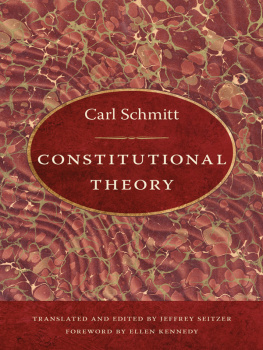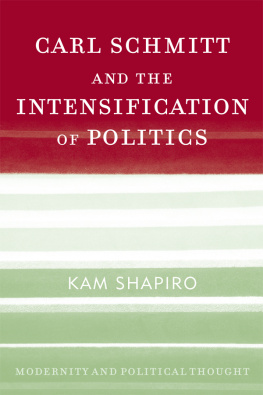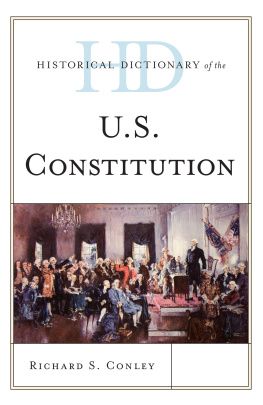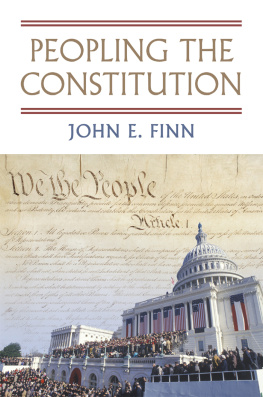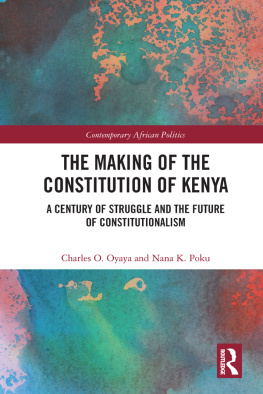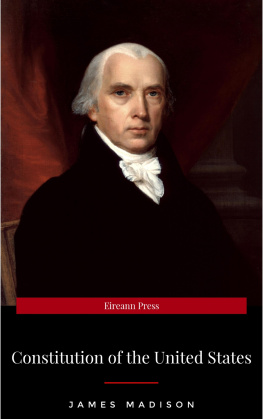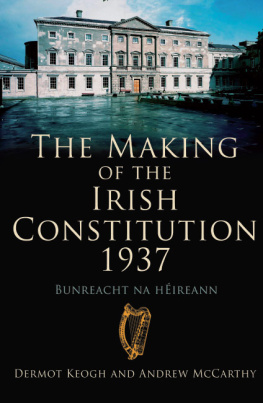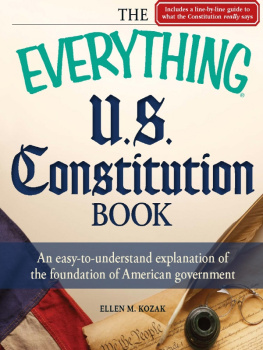Designed by C. H. Westmoreland
Typeset in Warnock Pro by Tseng Information Systems, Inc.
Foreword
Ellen Kennedy
The publication of Carl Schmitts Constitutional Theory (1928) fills a significant gap in the available English translations of this important political thinker. The text is remarkable for two things: its rigorous conception of a constitution and its concepts and the mastery of historical evidence and usage that informed and for long shaped the central ideas of law and political theory in the West. Constitutional Theory has never been out of print in German, and has long been available in the other major European languages. It now appears here in a felicitous and scholarly translation by Jeffrey Seitzer at an especially appropriate time.
Written simultaneously with his most famous text, The Concept of the Political, Schmitts Constitutional Theory addressed the boundary of the political. The first text makes the radical claim that the distinction between friend and enemy is a criterion by which all political actions and motives can be judgeda claim that appears to reduce our conception of politics to struggle, suggesting in a remarkable reversal of Clausewitz that politics is the extension of war by other means. The apparent imbalance is redressed by this book. The topic here is the political association of friends that is possible in the modern world and within the legal structure of the modern state.
Constitutional Theory differed importantly from other contemporary works on the liberal rule of law state (brgerliche Rechtsstaat) and from standard texts on constitutional law then and now. In the first place, it is not a case book and not a commentary but the theory of a particular type of state which is dominant today and of which the Weimar constitution was one example. Although there is an extensive register of articles of the Weimar constitution discussed herein, the reader will not find an account comparable to those of Gerhard Anschtz and others that were the standard texts of university teaching in Germany and crucial to informed judicial opinion. Schmitt offers, instead, a system that demonstrates the relationship of law and politics to each other, not just in this one German constitution, but in all constitutional states of the liberal rule of law type. The result is a brilliant attempt at what we today call comparative constitutionalism, and the following pages are replete with examples from across modern political history. More than that, it is an as yet unsurpassed political theory of the modern state in an age of world wars fought by arms and ideas that transformed the original foundations of the state.
Here, as in Schmitts other works, the tension between the democratic elements of the political constitution and liberal forms of the rule of law comes under scrutiny. In contrast to the polemics and pessimism of The Crisis of Parliamentary Democracy (1923), Constitutional Theory assumes that the mixed form of modern constitutions does not necessarily conflict with its democratic foundation, even though the task of balancing them, as Schmitts many historical examples demonstrate, is a constant demand.
It is, finally, an appropriate moment in the history of the liberal-democratic state and its rule of law for the appearance of Constitutional Theory in a translation that makes it available to a wide readership. The vulnerability of the constitution is never absent from the discussion. Behind controversies over particular articles, Schmitt argues, is the larger question of the constitution as a whole. This insistence on the constitution as a positive choice for political unity (pt. 1, sect.3) was Schmitts great contribution to the constitutional debates of the Weimar period. Read with The Concept of the Political, the present text captures the seriousness of constituting this people in this time, not as a set of technical issues in law and electoral strategy, but as a boundary that secures the existential survival of a particular way of life.
Constitutional Theory was a product of Weimars best years, a period of relative calm that soon gave way to intense crisis in which constitutional defense and constitutional treason were the bywords, as evidenced in Schmitts Legality and Legitimacy (1932), also translated for Duke University Press by Jeffrey Seitzer. In the present controversy over executive power and representation in the United States, the schematic of constitutional change at the end of part one of Constitutional Theory is an important perspective on normal constitutional disagreements. These need not become a cycle of constitutional violation and constitutional suspension as they did in Weimar.
Only a few paragraphs, less than a page, were ever added to the 1928 text. In 1954 Schmitt added a new preface, remarking that a systematic work such as the Constitutional Theory did not need to rush to compete with the many constitutional texts that emerge over time as long as the type remains. The American constitution of 1789 is one example of this type. It is scarcely mentioned here, but in Schmitts discussion of apocryphal acts of sovereignty the observant reader will find much to ponder in our current circumstances.
Translators Preface
There is considerable disagreement about Carl Schmitts contribution to political theory and his place in German history. Few dispute, however, that he was a gifted German stylist and a master essayist. Constitutional Theory is remarkable for the clarity and elegance of its prose, as are many of Schmitts essays from the Weimar period, such as Political Theology, The Crisis of Parliamentary Democracy, and Concept of the Political. Stylistically, however, it differs significantly from his essays. Cast in the form of a traditional treatise, the work is divided into elaborate sets of narrowly defined treatments of specific concepts, with each of these sections building on one another in a way that can become repetitive. Moreover, the work is replete with rather technical qualifying phrases, often inserted into the middle of already long sentences, meant to ensure the systematic development of the concepts in question.
Nonetheless, Schmitt presents his systematic treatment of constitutional theory in a highly readable form. This is because his deft use of the German languages structural variability, along with his extensive use of the passive voice, enables him to compensate for the inherent repetitiveness of such a lengthy, intricate, and highly technical argument.
The English language, however, is more limited in terms of sentence structure than German, and the frequent use of the passive voice poses significant stylistic problems for English prose. To maintain the clarity and flow of the original, therefore, I believe it necessary to diverge from a literal rendering. First, I use synonyms for key terms, such as

